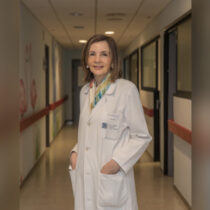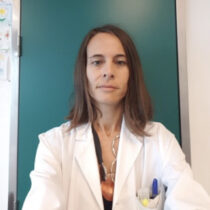Complexo Hospitalario Universitario de Santiago
Area of expertise and the Healthcare Provider’s contribution to care for patients within the MetabERN Network
Our UDyTEMC, created in 1978 and designated CSUR in 2015, provides continuous care to an average of 427 patients / year, of which 85% were diagnosed with an Inherited Metabolic Disorder (IMD) and 15% remain in study. More than 70% of patients come from outside the Reference Area.The amino acidopathies and organic acidurias group stands out because of its prevalence (237 patients) and for having been subject of further research (participation in two European competitive studies, E-IMD and E-HOD, and 24 publications in JCR of this field in the last 5 years). It also has extensive experience in β-oxidation and carbohydrates metabolism disorders, and lysosomal diseases.
For our contribution to the network, we can provide expertise and quality through:
- Care assistance level, besides the standardized management according to reference guidelines we also seek new trends of study focused on evolutionary parameters that can improve the therapeutic approach, prognosis and quality of life (assessment of bone markers, deficits or excess of vitamins and micronutrients by their background treatment, lipid profile and other cardiovascular risk factors (ADMA, estimating the wave velocity of the femoral carotid pulse by applanation tonometry as a direct marker of arterial stiffness, ..).
- Our national and international experience and participation in patient records (currently the Unit coordinates in Spain the European E-HOD and galactosemia registry) allows us to implement and contribute to the development of these records in these complex pathologies, to analyze the situation we start from and deepen the knowledge of their natural history, and establish standardized protocols and guidelines based on clinical evidence for these processes.
- We also have great experience in the group of diseases detected through expanded newborn screening by tandem mass spectrometry in our community which started in July 2000 and is one of the pioneer centers in Europe.
- In regards to education, the dissemination and training improvement in IMD at National and European level of professionals, families and affected patients can be a great contribution. Since December 2015 our Unit has an institutional chair of Inherited Metabolic Diseases at the University of Santiago de Compostela, and is developing a Master’s Degree on Inherited Metabolic Diseases, with 60 ECTS credits directed to health professionals in this field. Among the strengths of our unit, we also consider the recognition received from two Good Clinical Practices on Rare Diseases by the Ministry of Health according to the training of patients and families: one due to implementation of an online tool based on dietary- nutritional organization and calculation for patients with congenital metabolic diseases (www.odimet.es); and another by having a specific training program aimed to patients and families. All this leads to the improvement of their prognosis and quality of life.
- In regards to investigation, the Unit has extensive experience in projects of National and International research. Having a competitive research group working at the laboratory in the Unit and framed in a research institute accredited by ISCIII, also belonging to CIBERER as an affiliated clinical group, benefits the development of common projects.
specific treatments and interventions provided by the HCP
- Prevention: Genetic counseling and assessment for patients and their families.
- Acute Care: NICU, PICU, AUCI where monitoring of intensive care regimen, non-invasive (high flow, CPAP, BiPAP) and invasive (conventional mechanical ventilation, high oscillatory frequency) respiratory support, hemodynamic support, extrarenal depuration techniques (hemodiafiltration, hemodialysis), nitric oxide, ECMO is performed.
There is a specific warning system in the ER that notifies of the arrival of a metabolic patient as well as having specific protocols for metabolic decompensation. - Ambulatory services: include specific IMD consultations for pediatric and adult patients where diagnosis, treatment and monitoring are performed using standard protocols, and simultaneous diet and nutrition consultation for individualized dietary assessment.
Pediatric and adult Day Hospitals are available in which functional tests, replacement enzymatic treatments or others requiring special monitoring are carried out.
All these outpatient services are staffed with skilled nursing personnel.
Also telematics and telephone consultation are performed and scientific support and assistance to other Centers is provided. - Diagnostic services:
– Urgent specific biochemical determinations for IMD, 24 hours a day every day of the week, and other characteristics of a Level III Hospital.
– Biochemical determinations of amino acids, organic acids, acylcarnitines, 24 hours a day, by having a Metabolic Laboratory functionally integrated in the Unit and being available if required. Genetic analysis, featuring the implementation of Next-Generation Sequencing metabolic genetic panels (genetic panels as a support to the diagnosis of hypoglycaemia, glycosylation congenital defects, intermediary metabolism defects, mitochondrial disorders, metabolism disorders of complex molecules, leukodystrophies, metabolic myopathies). Other determinations are carried out in the Biomedical Diagnostic Centre (Barcelona) and Molecular Disorders Diagnostics Centre (CEDEM- Madrid).
– Functional Tests: oral BH4 overload test, pterines study, response test to B12 in methylmalonic acidemia, methionine overload test, nitrogen flow test, glucose or lactate pre-postprandial loading tests, stress tests …
– Imaging: conventional radiography, ultrasound scan (abdomen, heart, cerebral, skeletal-muscle, other systems), computed tomography, conventional MRI with spectroscopy, scintigraphy, positron emission tomography. DEXA.
– Pathological and anatomical study by optical and electronical microscopy.
– Cardiac and respiratory function tests
– Neurophysiology tests: Electromyography, electroneurography, integrated amplitude electroencephalogram, electroencephalogram video, auditory, visual and somatosensory evoked potentials.
– Cognitive function: Psychomotor Development Index (PDI) /Intellectual Quotient (IQ) tests. - Therapeutic services:
– Pharmacological treatment with stock of drugs at the Pharmacy Service for metabolic emergencies.
– Enzyme replacement therapy, i.v. intraventricular
– Possibility to use drugs not available in the country as foreign drugs
– Dietary and nutritional treatment:
– Special formulas and specific dietary modules. Medical foods
– Specific amino acids-free parenteral nutrition
– Individualized dietary and nutritional calculation
– Surgical treatment with pediatric and adult surgery: PEG gastrostomy, tracheotomy, subcutaneous reservoir, necessary interventions as a result from the disease or concomitant diseases. Difficult airway anesthesia.
-Transplantation (liver, kidney, cornea transplants from hematopoietic progenitors). - Early Care and Rehabilitation for pediatric and adult patients
- Social services. Psychological treatment support and counselling to patients and families.
- Palliative care with in-home assistance for technology-dependent patients.
Travesía da Choupana S/N, 15706 Santiago de Compostela, Spain



